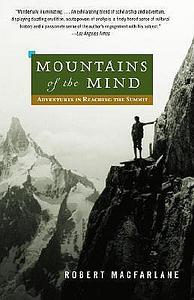Take a photo of a barcode or cover
It's hard for a Robert Macfarlane book about nature to miss, and in this book he captures perfectly the strange draw of mountains, tracing the history of it to explain, as much as it can be explained, why people are willing to brave nature that was not meant to be braved, and why others eulogise them for it. It's doubly interesting because the last chapter, about Everest and about Mallory in particular, feels like a culmination of Macfarlane's own obsession - Mallory's love for the mountain through Macfarlane's love for his story. It's myth making at the heart of this book, obvious in the fact that Hillary and Norgay are barely mentioned, something abstract, something at the heart of humanity.
Where this book falters is its avoidance of stories that lie outside - most glaringly the cursory acknowledgement of how the climbing of Everest stemmed from colonialism, because to further interrogate that would put paid to the romanticism required for many of these stories to affect you. The sacredness of Qomolangma is written off as bemusement of why anyone would want to climb the mountain, rather than how another culture had come and given it a different name. And much of the narrative is focused on Europe rather than other parts of the world, although this might be because a climbing culture originated from Europe.
I can understand why colonialism isn't engaged with given the story, but wish that somehow it might have been able to discuss it more. Still, it's a brilliant book on a fascinating subject and well worth a read.
Where this book falters is its avoidance of stories that lie outside - most glaringly the cursory acknowledgement of how the climbing of Everest stemmed from colonialism, because to further interrogate that would put paid to the romanticism required for many of these stories to affect you. The sacredness of Qomolangma is written off as bemusement of why anyone would want to climb the mountain, rather than how another culture had come and given it a different name. And much of the narrative is focused on Europe rather than other parts of the world, although this might be because a climbing culture originated from Europe.
I can understand why colonialism isn't engaged with given the story, but wish that somehow it might have been able to discuss it more. Still, it's a brilliant book on a fascinating subject and well worth a read.
Part academic analysis, part history book and part love-letter to the experience of mountains, I very much enjoyed reading this book. The sheer passion and beautiful language that are conveyed by Macfarlane are infectious and easily illustrate to non-mountaineers the draw to climb and the motivations behind it.
informative
inspiring
reflective
slow-paced
A fine companion to Nan Shepherd's The Living Moutain. While Shepherd was an expert at painting the beauty and detail acquired from a life lived in amongst particular mountains, Macfarlane delves deeper into the psychology and philosophy behind why we crave the mountains as a human beings.
It was not always so, early in our history we were afraid of the mountains, there lived devils and spectres and dragons. It was in the 1800s that the attitude shifted. The Victorian drive for adventure, exploration, and something distinctly different than their everyday drove people higher and higher up. What I enjoyed was seeing the cumulative and exponential emergence of influence on humanity by the writings of those explorers who came previously. With each subsequent write up or story, highlighting the heretofore unbeknownst feeling or experience of sight and light at those heights came the next inspired climber who in turn would write up their profound experience for the next reader.
Burke's notion of the Sublime played a key role as well. People began testing the feeling of awe mixed with fear - and nowhere prompted this feeling as perfectly as the mountains - where one could actually die given a wrong step.
I liked Macfarlane's commentary on the language of height and how it is always associated with a higher power or spiritual notion, or that of accomplishment. We "climb the ranks" of our companies, we don't "descend to the depths" of success. This language propelled man to vie for higher and higher purchases at the roof of the world, striving for firsts.
Both Mark Twain and the author summed it up nicely, in words that spoke directly to my heart (for I know a similar feeling from my work in the forests):
"Our need for speed...has accelerated us out of sync with the natural world." ~ Twain
"Mountains return to us the priceless capacity for wonder which can so insensibly be leached away by modern existence, and they urge us to apply that wonder to our own everyday lives." ~ Macfarlane
It was not always so, early in our history we were afraid of the mountains, there lived devils and spectres and dragons. It was in the 1800s that the attitude shifted. The Victorian drive for adventure, exploration, and something distinctly different than their everyday drove people higher and higher up. What I enjoyed was seeing the cumulative and exponential emergence of influence on humanity by the writings of those explorers who came previously. With each subsequent write up or story, highlighting the heretofore unbeknownst feeling or experience of sight and light at those heights came the next inspired climber who in turn would write up their profound experience for the next reader.
Burke's notion of the Sublime played a key role as well. People began testing the feeling of awe mixed with fear - and nowhere prompted this feeling as perfectly as the mountains - where one could actually die given a wrong step.
I liked Macfarlane's commentary on the language of height and how it is always associated with a higher power or spiritual notion, or that of accomplishment. We "climb the ranks" of our companies, we don't "descend to the depths" of success. This language propelled man to vie for higher and higher purchases at the roof of the world, striving for firsts.
Both Mark Twain and the author summed it up nicely, in words that spoke directly to my heart (for I know a similar feeling from my work in the forests):
"Our need for speed...has accelerated us out of sync with the natural world." ~ Twain
"Mountains return to us the priceless capacity for wonder which can so insensibly be leached away by modern existence, and they urge us to apply that wonder to our own everyday lives." ~ Macfarlane
Too much about the ‘heroes’, not enough about the mountains.
adventurous
slow-paced
emotional
informative
inspiring
reflective
relaxing
slow-paced
Do you hate gentlemen explorers? Yeah, me too, but it’s not a book in praise of the lordly mountaineers luckily- but there’s a lot of them in it.
It’s interesting and well written, but I’m glad I didn’t read this book first or I wouldn’t have read his others. Most especially The Old Ways, which I particularly loved
It’s interesting and well written, but I’m glad I didn’t read this book first or I wouldn’t have read his others. Most especially The Old Ways, which I particularly loved
adventurous
dark
emotional
informative
reflective
slow-paced
A beautifully written book on the history of mountains and mountaineering. MacFarlane has invested a great amount of research and emotion in writing this book and it is a must-have in every mountain-lover’s library. The book delves into how mountains were perceived 200-300 years ago and traces the evolution of mountaineering in the West’s imagination to the present day. He also reflects upon the human psyche that compels some people to give up their lives in pursuit of a greater glory. A must read with exquisite prose.
I have so many books by Robert that he ended up with a special section on one of my bookshelves (most of my books are dotted around in piles - such is the life of a bookseller with access to staff discount and lots of generous publishers...!) I love his spells/poetry, and particularly his recent book The World To Come with Johnny Flynn and Emily Sutton, but until now had only read one of his narrative non-fic books, Underland (which is SO good.)
The publishers kindly sent me a copy of this new editions of Rob's first book when it was released to mark the 20th anniversary - I started it back in February, and have been gradually making my way through it this year. It sometimes felt like I was reading slowly (not a bad thing!) - like perhaps I wasn't relating to the book so much as I've not been and climbed a mountain, barely a hill (being born in the Fens will do that for you!) but the further I got into the book, the more I was enjoying it. While I'm not entirely sure if these extreme climbing experiences are my cup of tea, I can completely appreciate and understand the desire to explore, and the further I got through the book, the more intrigued I was. Maybe a small peak is in my future?
The melding together of Rob's own experiences and his love of climbing with stories from history is really well done, and I raced through the last 100 or so pages. The second to last chapter on George Mallory and Everest is genuinely thrilling (and chilling?) 21 years since it was published, this book really stands the test of time and is an incredible first book, in my opinion. Introducing himself with this, there's no wonder Rob has gone on to be such a key figure in the area of nature and travel writing. If you like an adventure, love a mountain or just wonder what on earth draws people to push themselves and take risks, this book is for you.
Now, maybe I can read The Old Ways and Landmarks before Rob's new book Is A River Alive? comes out in May....
The publishers kindly sent me a copy of this new editions of Rob's first book when it was released to mark the 20th anniversary - I started it back in February, and have been gradually making my way through it this year. It sometimes felt like I was reading slowly (not a bad thing!) - like perhaps I wasn't relating to the book so much as I've not been and climbed a mountain, barely a hill (being born in the Fens will do that for you!) but the further I got into the book, the more I was enjoying it. While I'm not entirely sure if these extreme climbing experiences are my cup of tea, I can completely appreciate and understand the desire to explore, and the further I got through the book, the more intrigued I was. Maybe a small peak is in my future?
The melding together of Rob's own experiences and his love of climbing with stories from history is really well done, and I raced through the last 100 or so pages. The second to last chapter on George Mallory and Everest is genuinely thrilling (and chilling?) 21 years since it was published, this book really stands the test of time and is an incredible first book, in my opinion. Introducing himself with this, there's no wonder Rob has gone on to be such a key figure in the area of nature and travel writing. If you like an adventure, love a mountain or just wonder what on earth draws people to push themselves and take risks, this book is for you.
Now, maybe I can read The Old Ways and Landmarks before Rob's new book Is A River Alive? comes out in May....
A nice mix of the history of science (mostly geology and geography), arts/culture/perspective, personal history (he thanks his editor for getting him to include the "I" in this book - he is a 3rd or 4th generation mountain climber, so this is a history of mountain climbing as well), and quirky fact.
A bit disjointed at times, and the final, long chapter on Mallory does not really tie it all together. That chapter recounts Mallory's 3 attempts at Everest, and thankfully spends most of the pages on the less covered first 2 attempts.
Overall loved this, and read a short ebook by him already as well, and have other titles by him on hand, or on order. He has a new book out, and reading a review of that lead me to this.
A bit disjointed at times, and the final, long chapter on Mallory does not really tie it all together. That chapter recounts Mallory's 3 attempts at Everest, and thankfully spends most of the pages on the less covered first 2 attempts.
Overall loved this, and read a short ebook by him already as well, and have other titles by him on hand, or on order. He has a new book out, and reading a review of that lead me to this.





